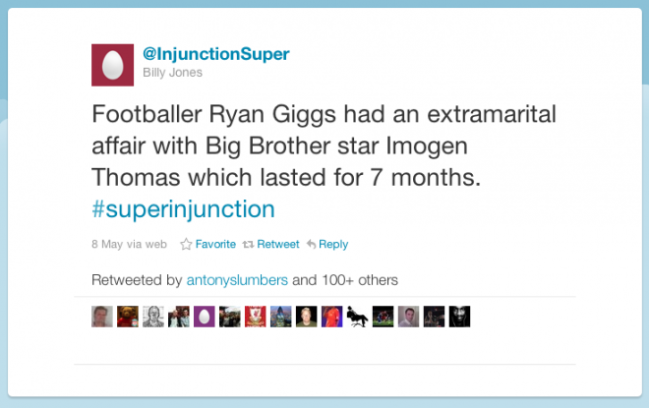 UK Prime Minister David Cameron is calling on British courts to examine the role Twitter is playing when it comes to privacy laws. According to the Telegraph, after the identity of a celebrity football player tied to a controversial British court case made the Twitter-rounds, advocates and industry officials are claiming that social media is unfairly distributing barred information. UK newspapers and print media are under a court “super-injunction” not to reveal the player’s identity, but social networking sites do not directly fall under this ruling.
UK Prime Minister David Cameron is calling on British courts to examine the role Twitter is playing when it comes to privacy laws. According to the Telegraph, after the identity of a celebrity football player tied to a controversial British court case made the Twitter-rounds, advocates and industry officials are claiming that social media is unfairly distributing barred information. UK newspapers and print media are under a court “super-injunction” not to reveal the player’s identity, but social networking sites do not directly fall under this ruling.
Cameron made an appearance on local talk show Daybreak to discuss the issue. “What I’ve said in the past is the danger is that judgments are effectively writing a new law, which is what Parliament is meant to do. So I think the government – Parliament – has got to take some time out, have a proper look at this, have a think about what we can do. But I’m not sure there is going to be a simple answer.”
Twitter has been considered a platform for free speech, but now legal authorities are saying the site and its users are acting above the law. “It is rather unsustainable, this situation, where newspapers can’t print something that clearly everybody else is talking about, but there’s a difficulty here because the law is the law and the judges must interpret what the law is,” Cameron said. “It’s not fair on the newspapers if all the social media can report this and the newspapers can’t, so the law and the practice has got to catch up with how people consume media today.”
There’s no denying the sites like Facebook and Twitter have revolutionized the way news and information is shared. News feed and microblogging services have made it virtually possible for anyone with an account and Internet access to act as press – and to do so anonymously and without any credentials whatsoever. And that’s where the issue of regulation becomes blurry: When does Internet gossip cross into illegal territory? It’s difficult if not impossible to police Twitter’s content, but it sounds as if this is exactly what Cameron thinks the courts need to consider.
It’s not only the issue of virally spreading confidential information that’s being questioned. Giving social sites the privilege of printing what they want puts print media at a serious disadvantage. Sure, print easily has more credibility that a Facebook post or Tweet, but there’s more than enough proof that people are willing to get their news from these less reliable platforms. Newspapers struggle enough as is, and putting them at yet another disadvantage threatens the industry.
Of course there are those that advocate for a free flow of communication, and that attempting to quell social sites is downright antiquated. A Massachusetts courtroom even implemented a social networking platform this year that allows court officials to keep citizens updated on various cases by using social media to promote government transparency.
Editors' Recommendations
- A look into Texas’ controversial anti-censorship law HB 20
- Facebook, Google, Microsoft, and Twitter team up to fight election interference
- Facebook sued by Australian privacy regulator over Cambridge Analytica scandal
- Facebook’s Twitter account taken over by hacker group OurMine
- Twitter’s new Privacy Center lets you know what’s happening with your data


